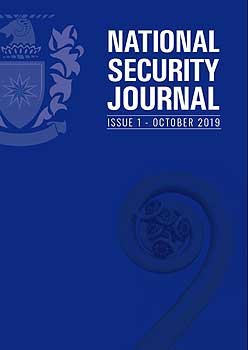
Dr John Battersby, managing editor of the new National Security Journal, and author of a chapter on New Zealand's terrorism history.
A new journal, to be launched next month, raises questions, identifies gaps and encourages dialogue about New Zealand’s national security settings.
The National Security Journal, produced by academics from Massey University’s Centre for Defence and Security Studies, aims to provide original thinking and informed debate about why we need a national security strategy, the lack of which journal contributors see as a fundamental omission.
They want to help connect the dots between current government security measures and a wider range of organisations, including in the private sector.
Managing editor and terrorism specialist Dr John Battersby says since the Christchurch mosque killings six months ago, assumptions about national security have been seriously challenged. The first issue of the journal focuses on areas that are important to security planning – such as new risks and threats facing primary industries and the private sector, as well as exploring past experiences of terrorism.
Professor Rouben Azizian, director of the Centre for Defence and Security Studies, says that the journal aims to provide a broad, inclusive approach in defining security and issues related to it. Conversations spanning the complex nature of security – including border security, cyber security and biosecurity as well as the links between domestic and international security – are timely, Professor Azizian says.

First edition of National Security Journal.
Contributing writer Chris Rothery, a senior lecturer at the centre, focuses in his article, Time for a National Security Strategy, on the absence of an all-encompassing, forward-looking strategy in New Zealand. The closest thing we have – the National Security Handbook 2015 – is “a document more akin to a guide of what happens in the event of an emergency”, he says.
Mr Rothery says the purpose and value of having a national security strategy would be to “provide government agencies with a centralised and common direction and guidance” and ensure government and non-government agencies are coordinated. It should be “a living document” that is not tied to a specific threat but designed to evolve and adapt according to a changing geopolitical environment. Nor should it just focus on the military, “but on all sectors of government that deliver elements of national security”, he says.
In his article, The Changing New Zealand National Security Environment, Dr Wil Hoverd highlights the impact of the Christchurch terror attacks in marking “a major sea change in how we think about and do national security”.
He acknowledges the results of the Royal Commission of Inquiry into the Attack on Christchurch Mosques will identify new priorities in national security and he anticipates a broader focus on ‘extremism’ rather than ‘radicalization’, which tends to veer towards Muslim communities.

Professor Rouben Azizian.
Insights on New Zealand’s terrorism history
Dr John Battersby, in his article The Ghost of New Zealand’s Terrorism Past and Present, explores assumptions about the non-existence of terrorism in New Zealand prior to March 15. He brings to light a history of terrorism in this country – defined as “violence or threats perpetrated in an attempt to influence the social and political environment.”
This includes bombings in 1970 of military bases and government buildings as part of anti-Vietnam War protests, arsons connected to the abortion debate in the early 1970s as well as international terrorism connected to a 1975 plot to bomb the Indian High Commission in Wellington and the 1985 sinking of the Rainbow Warrior. Bombings of the Wanganui Police computer centre and Wellington Trade’s Hall in the 1980s are also considered.
Dr Battersby says these and other incidents were arguably all “missed” by security agencies, and deemed to have occurred “out of the blue”. And, while we are yet to devise a system that can detect or prevent autonomous actor attacks, he says, “New Zealand would be in a better position to mitigate the risk of future terrorism if it owned up to its terrorism history, and critically noted and analysed the trends that have emerged over time in its terrorism experience as an indicator of what may emerge tomorrow”.
Other contributions include an article on counterfeiting in the primary industry sector and the economic threat this poses. Examples include wine, kiwifruit, apples, pears, manuka honey and dairy products. A further article, by Nick Dynon, argues for the role of the private security sector as a national security enabler, pointing out that New Zealand’s private security sector employs numbers roughly comparable to the state’s police and military combined. Mr Dynon says the sector could contribute to national security. The journal will be launched in Wellington on October 2.